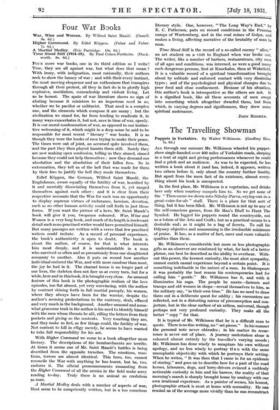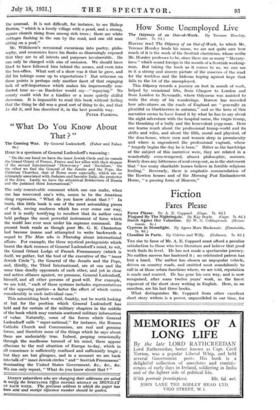The Travelling Showman
ALL through one summer Mr. Wilkinson wheeled his puppet- show single-handed over 400 miles of Yorkshire roads, sleeping in a tent at night and giving performances whenever he could find a pitch and an audience. As was to be expected, he has written a book about it (and has, indeed, it appears, written two others before it, only about the country further South). But apart from the mere fact of its existence, almost every- thing about his book is unexpected.
In the first place, Mr. Wilkinson is a vegetarian, and drinks beer only when courtesy compels him to. So we get none of the " Then-came-we-down-into-Nibsby-Parvarerying-out-in-a great-voice-for-ale " stuff. There is a place for that sort of thing, but it has been filled. Mr. Wilkinson is not up to any of the self-conscious games, from He Man's Bluff to Hunt The Symbol. He lugged his puppets round the countryside, not as a totem of the Arts and Crafts, but as a practical means to a desirable end : as it might be a bag of ferrets. To call his Odyssey objective and unassuming is the irreducible minimum of praise. It has, as a matter of fact, rarer and more valuable qualties than these.
Mr. Wilkinson's considerable but more or less photographic gifts as an observer are reinforced by what, for lack of a better phrase, can best be described as the ability to overhear. With- out this power, the keenest curiosity, the most alert sympathy, cannot enrich casual experience beyond a certain point. It is something indefinable in the nature of a man. In Shakespeare it was probably the best reason his contemporaries had for calling him " gentle." Mr. Wilkinson has it, and with it illuminates his saga. The people he meets--farmers and tramps and old women in shops—reveal themselves to him, as the military say, "in their own time." He has no need to draw them out in a deliberate quest for oddity ; his encounters are reflected, not in a distorting mirror of preconception and con- jecture, but in the clear surface of an artless, universal, though perhaps not very profound curiosity. They make all the better " copy " for that.
It is typical of Mr. Wilkinson that he is a difficult man to quote. There is no fine writing, no " set pieces." In his manner the personal note never obtrudes ; in his matter its recur- rence is never out of place. A journey undertaken alone is coloured almost entirely by the traveller's varying moods ; Mr. Wilkinson has done wisely to recapture his own without apology, and no less wisely to portray ti ext with -the same unemphatic objectivity with which he portrays their setting. When he writes, " It was then that I came in for an epidemic of staring," and goes on to describe how for a part of the road horses, labourers, dogs, and lorry-drivers evinced a suddenly noticeable curiosity in him and his barrow, the reality of that morning's march is sharply brought home by analogy with our own irrational experience. As a painter of scenes, his 'honest, photographic attack is most at home with normality. He can remind us of the average more vividly than he can reconstruct
the unusual. It is not difficult, for instance, to see Bishop Burton, " which is a lovely village with a pond, and a strong, square church rising from among rich trees ; there are white cottages flashing in the sun by the road, and one old man sitting on a post."
Mr. Wilkinson's occasional excursions into poetry, philo- sophy, and economics leave his flanks so disarmingly exposed that they are to all intents and purposes invulnerable. He can only be charged with sins of omission. We should have liked to have followed him behind the scenes, and even into the box-office. What sort of a show was it that he gave, and did his takings come up to expectations ? But reticence on these points is perhaps only another facet of that engaging lark of self-importance which makes his impersonally con- ducted tour so—as Baedeker would say—" repaying." No county could wish for a kindlier or a more quietly skilful showman. It is impossible to read this book -without feeling that the thing he did was a good sort of thing to do, and that be did it, and has described it, in the best possible way.
PETER FLEMING.



































 Previous page
Previous page